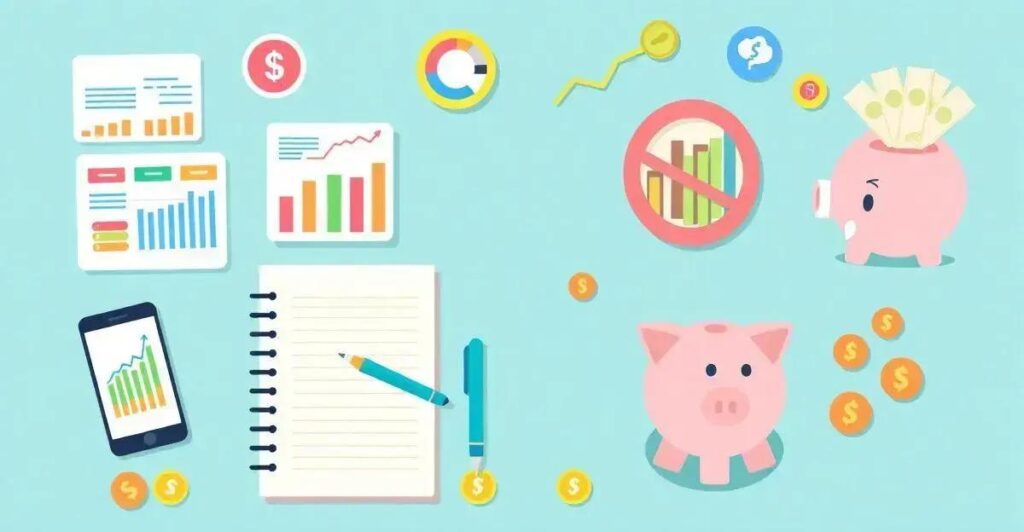Are you tired of living paycheck to paycheck, wondering where your money goes each month? Budgeting tools can be a game-changer for your finances.
With the right tools, you can take control of your spending, save money, and achieve your financial goals.
In this post, we’ll explore the benefits of using budgeting tools, how to choose the right one for you, and some of the top tools available today.
Whether you’re looking to pay off debt, build an emergency fund, or save for a big purchase, budgeting tools can help you get there.
Introducing Budgeting Tools: A New Way to Manage Finances
Budgeting tools have revolutionized the way individuals and families manage their finances. By providing a clear picture of income and expenses, these tools enable users to make informed decisions about their money. With budgeting tools, it’s possible to track spending, create a savings plan, and even set financial goals. Whether you’re looking to pay off debt, build an emergency fund, or save for a big purchase, budgeting tools can help you achieve your financial objectives.
Using budgeting tools offers numerous benefits, including improved financial discipline, reduced financial stress, and enhanced financial literacy. Budgeting tools also help individuals and families to identify areas where they can cut back and make adjustments to achieve their financial goals. Additionally, budgeting tools provide a clear picture of income and expenses, enabling users to make informed decisions about their money. By using budgeting tools, you can take control of your finances and achieve financial stability.
With so many budgeting tools available, choosing the right one can be overwhelming. To make an informed decision, it’s essential to consider your financial goals, budgeting style, and level of technical expertise. Look for a budgeting tool that is user-friendly, offers flexibility, and provides regular updates. Additionally, consider the cost of the tool, as well as any additional features such as investment tracking or bill payment reminders. By choosing the right budgeting tool, you can ensure that you’re using a tool that meets your needs and helps you achieve your financial objectives.
Depending on your financial goals, there are various budgeting tools that can help you achieve success. For example, if you’re looking to pay off debt, consider using a debt repayment calculator or a budgeting app that offers debt consolidation features. If you’re building an emergency fund, look for a budgeting tool that offers savings tracking and goal setting features. Whatever your financial goal, there’s a budgeting tool out there that can help you achieve it.
While budgeting tools can be incredibly powerful, there are common mistakes to avoid when using them. One mistake is not tracking expenses regularly, which can lead to overspending and financial stress. Another mistake is not setting realistic financial goals, which can result in disappointment and frustration. Additionally, avoid using a budgeting tool that is too complicated or overwhelming, as this can lead to abandonment. By avoiding these common mistakes, you can ensure that you’re getting the most out of your budgeting tool and achieving your financial objectives.
Benefits of Using Budgeting Tools

Introducing Budgeting Tools: A New Way to Manage Finances
The benefits of using budgeting tools are numerous. For one, they provide a clear picture of income and expenses, allowing users to make informed decisions about their money. Budgeting tools also help individuals and families to identify areas where they can cut back and make adjustments to achieve their financial goals. Additionally, budgeting tools offer a sense of financial security and stability, reducing financial stress and anxiety. By using budgeting tools, individuals and families can take control of their finances and achieve long-term financial success.
When using budgeting tools, it’s essential to avoid common mistakes that can hinder success. One mistake is not regularly tracking expenses, which can lead to overspending and financial stress. Another mistake is not setting realistic financial goals, which can result in disappointment and frustration. Additionally, avoid using a budgeting tool that is too complicated or overwhelming, as this can lead to abandonment. By being aware of these common mistakes, individuals and families can use budgeting tools effectively and achieve their financial objectives.
Take Control of Your Finances with Budgeting Tools
How to Choose the Right Budgeting Tool for You
When selecting a budgeting tool, it’s essential to consider your financial goals, budgeting style, and level of technical expertise.
Start by identifying your needs and priorities, such as tracking expenses, creating a budget, or investing.
Research different budgeting tools and read reviews to determine which one best meets your needs.
Factors to Consider
Consider factors such as user interface, customer support, and features like automated savings and investment tracking.
It’s also important to ensure the tool is secure and reputable.
By choosing the right budgeting tool, you can ensure a seamless and effective budgeting experience.
Top Budgeting Tools for Different Financial Goals

Whether you’re looking to pay off debt, build an emergency fund, or save for a big purchase, there’s a budgeting tool out there that can help you achieve your financial goals.
For debt repayment, consider using a debt consolidation tool or a budgeting app that offers debt tracking and goal setting features.
For building an emergency fund, look for a budgeting tool that offers savings tracking and goal setting features.
For saving for a big purchase, consider using a budgeting app that offers investment tracking and goal setting features.
By choosing the right budgeting tool for your financial goals, you can stay on track and achieve success.
Common Mistakes to Avoid When Using Budgeting Tools
When using budgeting tools, it’s crucial to avoid common mistakes that can hinder success. One mistake is not regularly tracking expenses, which can lead to overspending and financial stress.
Another mistake is not setting realistic financial goals, which can result in disappointment and frustration.
Additional Considerations
Additionally, avoid using a budgeting tool that is too complicated or overwhelming, as this can lead to abandonment. It’s also essential to ensure the tool is secure and reputable, and to regularly review and update your budget to stay on track.
Conclusion: Take Control of Your Finances with Budgeting Tools

The adoption of Artificial Intelligence (AI) can bring numerous benefits to small businesses, from automating repetitive tasks to personalizing customer service and analyzing data.
The implementation of AI should be done gradually, identifying areas that can benefit immediately and conducting pilot projects to assess the efficiency of these solutions.
Success Stories
Success stories in different sectors show how AI can be a powerful tool to boost growth and improve operational efficiency.
With AI, small businesses can not only compete on equal footing with larger companies but also innovate and create new opportunities in the market.
Therefore, do not overlook the potential of AI to revolutionize your business.
FAQ – Frequently Asked Questions about Budgeting Tools
How do budgeting tools help me manage my finances?
Budgeting tools provide a clear picture of your income and expenses, allowing you to make informed decisions about your money. They also help you identify areas where you can cut back and make adjustments to achieve your financial goals.
What are the benefits of using budgeting tools?
Budgeting tools offer numerous benefits, including improved financial discipline, reduced financial stress, and enhanced financial literacy. They also provide a sense of financial security and stability, helping you achieve long-term financial success.
How do I choose the right budgeting tool for me?
When selecting a budgeting tool, consider your financial goals, budgeting style, and level of technical expertise. Research different tools and read reviews to determine which one best meets your needs.
What are some common mistakes to avoid when using budgeting tools?
Common mistakes to avoid include not regularly tracking expenses, not setting realistic financial goals, and using a tool that is too complicated or overwhelming. Ensure the tool is secure and reputable, and regularly review and update your budget to stay on track.
Can I use budgeting tools to achieve specific financial goals?
Yes, budgeting tools can help you achieve specific financial goals, such as paying off debt, building an emergency fund, or saving for a big purchase. Choose a tool that offers features and tracking options that align with your goals.
How do I take control of my finances with budgeting tools?
To take control of your finances with budgeting tools, start by setting clear financial goals, tracking your expenses, and regularly reviewing and updating your budget. Use the insights and recommendations provided by your budgeting tool to make informed decisions and stay on track.



